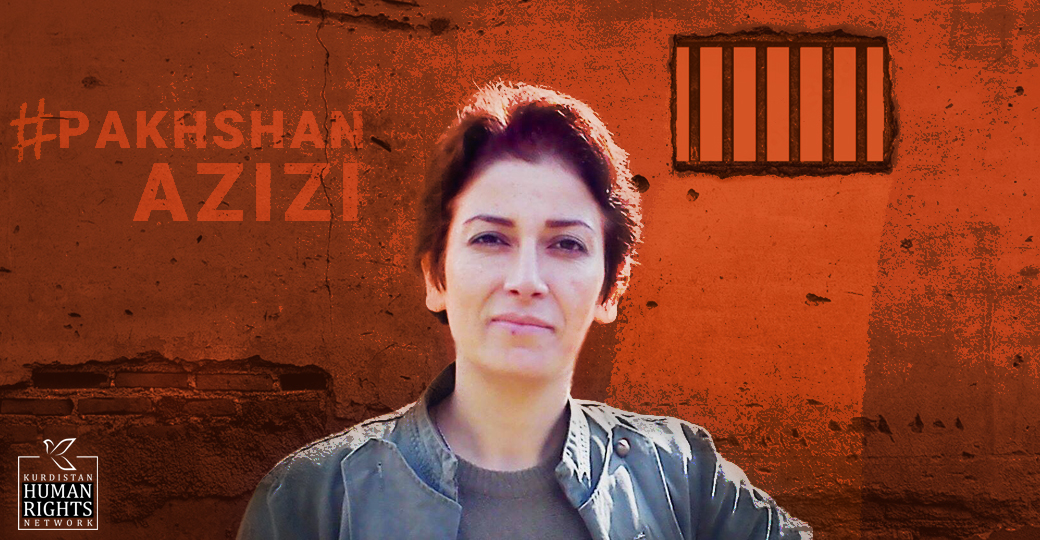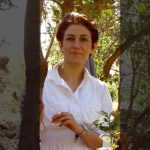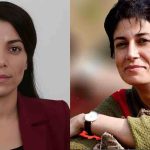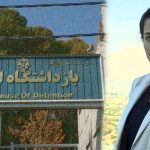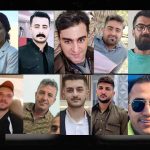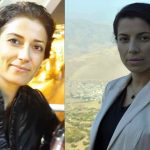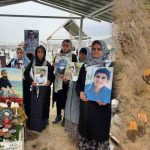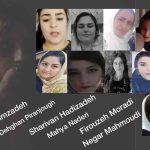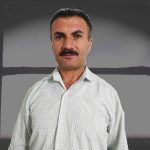Pakhshan Azizi, a graduate in social work from Allameh Tabataba’i University in Tehran, has a history of previous arrests by security forces. She was first detained on 16 November 2009 during a protest gathering of Kurdish students at Tehran University against political executions in Kurdistan.
She was released on bail after four months of detention and eventually left Iran, residing in the Kurdistan Region of Iraq in recent years.
Additionally, following the Islamic State’s (IS) attack on Syrian Kurdistan (Rojava), she worked for several years as a social worker in refugee camps for war-displaced individuals.
Arrest
Azizi was arrested by the Ministry of Intelligence in Tehran on 4 August 2023 and taken to Ward 209 of Evin Prison. Several of her family members were arrested at the same time, but released after a few days of interrogation.
During her detention, she was denied the right to an attorney and was subjected to pressure and torture to extract forced confessions. On 11 December 2023, she was transferred from Ward 209 to the women’s ward of Evin Prison.
Judicial Process
In February 2024, after two appearances at Branch Five of the Public and Revolutionary Prosecutor’s Office in Tehran, she was charged with “armed insurrection” (baghi), which carries the death penalty in Iran.
Her first and second court sessions were held on 28 May and 16 June 2024, at Branch 26 of the Islamic Revolutionary Court of Tehran, presided over by Judge Iman Afshari.
On 23 July 2024, her lawyers were informed that she had been sentenced to death and four years in prison.
According to the verdict issued by Branch 26 of the Islamic Revolutionary Court in Tehran, Azizi’s death sentence stemmed from charges of “armed insurrection” through “effective activities and efforts using weapons to advance the goals of groups that have carried out armed uprisings against the Islamic government and whose leadership remains intact”.
The verdict also states that she was sentenced to four years in prison for “membership of opposition groups” through membership of the Kurdistan Free Life Party (PJAK).
The verdict, referring to the anti-government protests of Women, Life, Freedom following the government-sanctioned murder of Jina Mahsa Amini, which it dubbed the “2022-23 riots”, stated, “She [Pakhsan Azizi] entered the country to inflame the situation in Iran, contacted the families of those killed in the riots of 2022-23, explained to them the goals and programmes of the opposition group, and encouraged them to continue their protests and not to give up the blood revenge for their children.”
Throughout her interrogations at the Detention Facility 209 of Tehran’s Evin Prison and her court appearances, Azizi vehemently denied any involvement in armed operations or membership of PJAK.
Azizi also wrote a letter from prison titled “Concealing the Truth and Its Alternative,” published on 27 July 2024 by Bidarzani media, in which she explained his political and social thoughts and activities in response to the accusations made by security and judicial authorities. She recounted the violent manner of her arrest and that of her family by security forces, as well as the torture she endured during her detention.
Mazyar Tataei and Amir Raeisiyan, the lawyers representing Azizi, stated in an interview with Shargh Daily after the issuance of the death sentence for their client that they refuted any involvement of Azizi in armed operations.
They emphasized that her activities were focused on helping war-torn refugees in Syrian Kurdistan (Rojava), and added: “Even the verdict itself makes no reference to any armed activity or armed confrontation involving Ms Azizi with any governmental or non-governmental Iranian individuals or entities.”
The lawyers for have filed an appeal against the court ruling.
Current Status
Azizi is currently being held in the women’s ward of Evin Prison.
Additional Information
– On 8 November 2023, the Bitawan website, which is affiliated with the Ministry of Intelligence, reported the arrest of three individuals, including Pakhshan Azizi and Wrisha Moradi. While the website did not specify the date of their arrest, it described them as members of the Kurdistan Free Life Party (PJAK).
– On 15 May 2024, she went on a one-day hunger strike and sit-in protest against the transfer of Wrisha Moradi to Ward 209 of Evin Prison.
– On 6 August 2024, along with other female political prisoners in Evin Prison, she protested against the execution of Reza Rasaei. In response to these protests, prison guards attacked the women’s ward and assaulted several political prisoners.
Notes:
1. Article 287 of the Islamic Penal Code: “A group engaging in armed rebellion against the Islamic Republic of Iran is considered rebellious, and if they use weapons, their members are subject to the death penalty.”
2. The Kurdistan Free Life Party (PJAK) was established in 2004 in the Qandil Mountains along the border of Iraqi Kurdistan with Iranian Kurdistan. This party follows the ideas of Abdullah Öcalan, the imprisoned leader of the Kurdistan Workers’ Party (PKK), and bases its activities on the paradigm of a “democratic and ecological society based on women’s freedom”.
According to the party’s charter, PJAK considers the establishment of democratic confederalism and a political form of democratic self-governance for organising people to build a “democratic nation” as one of its fundamental goals. PJAK also participated in the establishment of the East Kurdistan Democratic and Free Society (KODAR). The headquarters of this party is in the mountainous areas between Iraqi Kurdistan and Iranian Kurdistan.
3. Women, Life, Freedom Uprising: Jina Amini (Mahsa Amini), a 21-year-old Kurdish woman from Saqqez, Kurdistan Province, was arrested on a street in Tehran on 13 September 2022 by the morality police because of the way she was dressed. Shortly after her arrest, she was transferred to Kasra Hospital in Tehran with head injuries and symptoms of brain death, and passed away three days later on 16 September 2022. The government’s killing of Jina sparked unprecedented anti-government protests, which began with a large turnout at her funeral at Aichi Cemetery in Saqqez and quickly spread to many cities across Iran. These widespread protests against the Islamic Republic of Iran, which lasted for several months, resulted in at least 527 protesters being killed and thousands injured and arrested. The protests are known for their central slogan of “Women, Life, Freedom” (Kurdish: Jin, Jiyan, Azadi).

